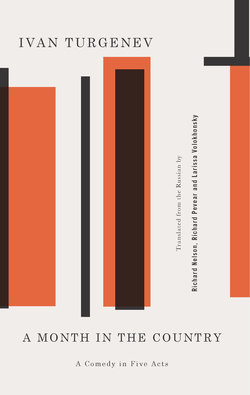A Month in the Country

Реклама. ООО «ЛитРес», ИНН: 7719571260.
Оглавление
Иван Тургенев. A Month in the Country
Отрывок из книги
ALSO IN THIS SERIES:
The Inspector
.....
Turgenev was one of the “men of the Forties,” as they came to be known. At the age of nineteen he twice saw Alexander Pushkin from a distance, not long before the poet was killed in a duel. His collection of stories, A Hunter’s Notes, was praised by Nikolai Gogol. But his contemporaries were the liberal intellectuals who emerged during the last years of the repressive reign of Nicholas I, largely in response to its repression. From 1838 to 1841, Turgenev studied classics and philosophy at the University of Berlin, where he made friends with a group of “Russian Hegelians,” among them Mikhail Bakunin, later the chief exponent of Anarchism, who was the model for the hero of his first novel, Rudin. In Russia and then in their “self-exile” abroad he made the acquaintance of Alexander Herzen and Vissarion Belinsky, two of the most forceful social critics of their time, opponents of the Russian autarchy and above all of serfdom. When his mother died in 1850, Turgenev returned to Russia to arrange the affairs of the estate at Spasskoe. One of his first acts was to free the household serfs; he also enabled the peasants to buy their freedom at rates very advantageous for them. This was more than a decade before the new emperor, Alexander II, known as the “tsar-liberator,” signed the proclamation that finally put an end to serfdom. The stories collected in A Hunter’s Notes were, among other things, a sharply critical portrayal of the conditions of serfdom and the life of the landed gentry. The book’s publication in 1852 cost Turgenev a month in prison and a year in “exile” on his estate. He was not allowed to travel abroad again until 1856.
Two figures came to typify the intellectuals of mid-nineteenth-century Russia: the superfluous man, and the nihilist. Both terms were coined by Turgenev, the first in his novella of 1850, The Diary of a Superfluous Man, and the second in his novel Fathers and Sons, published in 1862. While Turgenev shared the liberalism of his intellectual contemporaries, who often found themselves “superfluous” in the Russia of Nicholas I, he came to detest the revolutionary and utopian extremism that was embodied by the nihilists, the so-called “new men” of the Sixties, whose first spokesman was the thinker and novelist Nikolai Chernyshevsky. Chernyshevsky’s thesis, The Aesthetic Relations of Art to Reality, which he defended at the university in 1855, the same year that A Month in the Country was published, propounded a purely utilitarian notion of art. Turgenev found his writing physically repulsive; Tolstoy said that it “stinks of bedbugs.” A later aristocrat, Vladimir Nabokov, gave us the most pitiless and at the same time moving portrait of Chernyshevsky in the fourth chapter of his novel The Gift.
.....